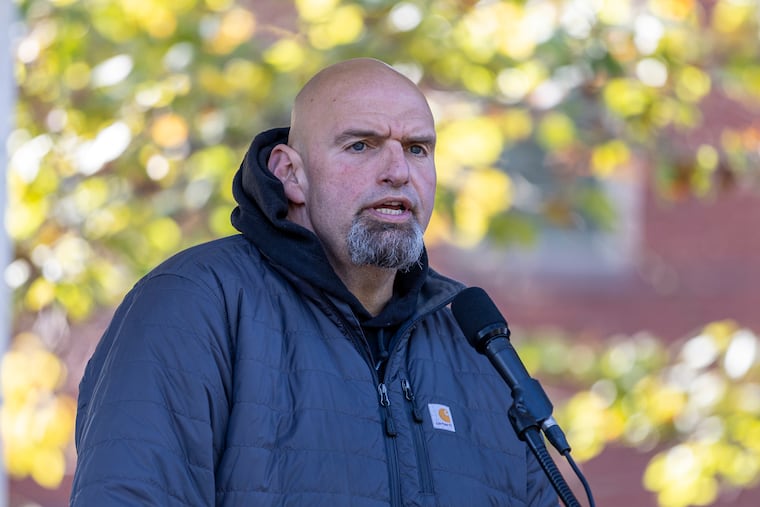How stroke patients like John Fetterman can retrain their brains
By doing therapeutic exercises, patients in Fetterman's situation can continue to make progress for many months, experts say.

In Tuesday’s Senate debate, John Fetterman may, at times, fumble for the right word. He also may pause for a second or two in responding, as he will be reading real-time captions of what opponent Mehmet Oz and the debate moderators say.
Rehabilitation specialists say that these lingering effects of Fetterman’s May 13 stroke are no surprise, and that by doing therapeutic exercises, patients in his situation can continue to make progress for many months.
And for debate viewers who might wonder if these types of speech issues are any reflection of diminished intellect, stroke experts say the answer is no.
Fetterman’s physicians have said his stroke caused deficits in something called auditory processing. That term may be confusing for laypeople, because it sounds as if it refers to hearing ability, not speech, said Brooke Hatfield, a speech-language pathologist who works for the American Speech-Language-Hearing Association (ASHA).
In fact, auditory processing refers to a host of brain functions that make both hearing and speaking possible — among them, recognizing sounds as speech, mapping them against known words, and formulating a response. These language networks in the brain are distinct from the pathways involved in critical thinking and cognition, Hatfield said.
That explains why a sharp person may sometimes stumble to get words out, whereas a glib speaker isn’t necessarily equipped with a razor-sharp intellect, she said.
“We all know people who are wonderful talkers,” she said. “But when you think back on what they’ve said, there may not be much substance.”
Retraining the brain
In an Oct. 15 letter, Fetterman’s primary-care physician said the candidate’s communication skills had steadily improved as a result of speech therapy.
Those types of exercises are not designed to repair stroke-damaged neurons, said Thomas Watanabe, clinical director of the stroke rehabilitation program at MossRehab, part of Jefferson Health. Instead, such therapies prompt the brain to forge new pathways with healthy neurons — in effect, learning to arrive at the same destination by taking a different route.
In addition to developing new networks in the brain, patients also can learn various coping strategies, he said. For example, if individuals have trouble following spoken instructions, they can ask for them to be written down.
Watanabe stressed that he had no direct knowledge of Fetterman’s history. But he said it was possible for stroke patients to regain their full abilities, especially if the stroke was mild.
“Most people would say his stroke is mild, because obviously he’s getting around and doing a lot of things,” the MossRehab physician said.
Still, lingering deficits in auditory processing can be frustrating, said Hatfield, ASHA’s associate director for health-care services in speech-language pathology.
One of her former patients likened it to having a messy sock drawer, she said.
“You know the socks are in there but can’t find them,” she said.
Which exercises can help
To develop new pathways in the brain, patients can practice by thinking about commonplace objects in different ways, Hatfield said.
For example, the word strawberry for many people would call to mind the image of a small red fruit with seeds on the outside, she said. People with auditory processing issues can practice expanding their frames of reference by thinking about where they can be purchased, what nutrients they contain, or what recipes require them.
“I would ask you to tell me everything about it,” she said. “Tell me every feature you can think of, and put that into a sentence.”
Another typical exercise involves listening to voicemail messages. For someone who struggles at first, Hatfield would remind them to think in advance about key points to listen for, such as who, what, where, and when.
Though they may sound straightforward, these types of exercises are taxing.
“You can’t see it like you see somebody running on a treadmill,” Hatfield said. “But at the end of a session, they’ll say ‘I am exhausted,’ because they are working really, really hard.”
What about accommodations?
In a recent interview with Fetterman, NBC News reporter Dasha Burns spent much of the time asking about his lingering speech issues and use of a caption device.
In Tuesday’s debate, some viewers may wonder if these issues would affect his ability to serve in the Senate.
Watanabe said auditory processing deficits might be an issue in a job requiring the person to engage in rapid-fire exchange, such as a professional translator. But he noted that Fetterman’s physician has placed the candidate under no restrictions, saying that he “can work full duty in public office.”
To those who view a compensatory strategy as a concern, Hatfield said it is actually a sign that the person’s brain is nimble enough to learn new workarounds.
“If a person is using compensatory strategies, does that mean that there’s a problem?” she said. “The opposite is true: Successful use of compensatory strategies is a wonderful recovery outcome. If they can do what they need to do with those supports, it doesn’t matter.”